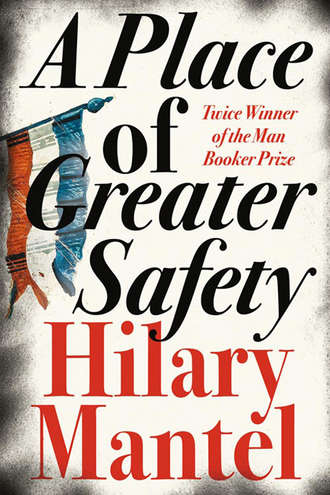
Полная версия
A Place of Greater Safety
Baby Jesus, he thought. He said, ‘I know.’
When this happened, he was six. A white curtain fluttered in the breeze from the open window, sparrows fussed on the sill; God the Father, trailing clouds of glory, looked down from a picture on the wall.
THEN IN A DAY OR TWO, sister Charlotte pointing to the coffin; his smaller sister Henriette grumbling in a corner, fractious and disregarded.
‘I will read to you,’ he told Charlotte. ‘But not that animal book. It is too childish for me.’
Later the grown-up Henriette, who was his aunt, lifted him up to look in the coffin before it was closed. She was shaking, and said over his head, ‘I didn’t want to show him, it was Grandfather Carraut who said it must be done.’ He understood very well that it was his mother, the hatchet-nosed corpse with its terrifying paper hands.
Aunt Eulalie ran out into the street. She said, ‘François, I beg of you.’ Maximilien ran after her, grabbing at her skirts; he saw how his father did not once turn back. François strode down the street, off into the town. Aunt Eulalie towed the child with her, back into the house. ‘He has to sign the death certificate,’ she said. ‘He says he won’t put his name to it. What are we going to do?’
Next day, François came back. He smelled of brandy and Grandfather Carraut said it was obvious he had been with a woman.
During the next few months François began to drink heavily. He neglected his clients, and they went elsewhere. He would disappear for days at a time; one day he packed a bag, and said he was going for good.
They said – Grandmother and Grandfather Carraut – that they had never liked him. They said, we have no quarrel with the de Robespierres, they are decent people, but him, he is not a decent person. At first they kept up the fiction that he was engaged in a lengthy and prestigious case in another city. He did return from time to time, drifting in, usually to borrow money. The elder de Robespierres – ‘at our time of life’ – did not feel they could give his children a home. Grandfather Carraut took the two boys, Maximilien and Augustin. Aunt Eulalie and Aunt Henriette, who were unmarried, said they would take the little girls.
At some point during his childhood, Maximilien found out, or was told, that he had been conceived out of wedlock. Possibly he put the worst construction on his family circumstances, because during the rest of his life he never mentioned his parents at all.
IN 1768 FRANÇOIS de Robespierre turned up in Arras after an absence of two years. He said he had been abroad, but he did not say where, or how he had lived. He went over to Grandfather Carraut’s house, and asked to see his son. Maximilien stood in a passageway and heard them shouting from behind a closed door.
‘You say you have never got over it,’ Grandfather Carraut said. ‘But have you stopped to ask your son whether he has got over it? The child is her image, he’s not strong; she was not strong; you knew that when you forced yourself on her after each childbirth. It’s only thanks to me that they have any clothes to their backs and are growing up Christians.’
His father came out and found him and said, he’s thin, he’s small for his age. He spent a few minutes talking to him in a strained and embarrassed way. Leaving, he bent down to kiss him on the forehead. His breath was sour. The love child jerked his head back, with an adult expression of distaste. François seemed disappointed. Perhaps he wanted a hug, a kiss, to swing his son around in the air?
Afterwards the child, who had learned to measure out sparingly his stronger emotions, wondered if he ought to be sorry. He asked his grandfather, ‘Did my father come to see me?’
The old man grumbled as he moved away. ‘He came to borrow money again. Grow up.’
Maximilien gave his grandparents no trouble at all. You would hardly know he was in the house, they said. He was interested in reading and in keeping doves in a cote in the garden. The little girls were brought over on Sundays, and they played together. He let them stroke – very gently, with one finger – the doves’ quivering backs.
They begged for one of the doves, to take home and keep for themselves. I know you, he said, you’ll be tired of it within a day or two, you have to take care of them, they’re not dolls you know. They wouldn’t give up: Sunday after Sunday, bleating and whining. In the end he was persuaded. Aunt Eulalie bought a pretty gilt cage.
Within a few weeks the dove was dead. They had left the cage outside, there had been a storm. He imagined the little bird dashing itself in panic against the bars, its wings broken, the thunder rolling overhead. When Charlotte told him she hiccupped and sobbed with remorse; but in five minutes, he knew, she would run out into the sunshine and forget it. ‘We put the cage outside so he would feel free,’ she sniffed.
‘He was not a free bird. He was a bird that needed looking after. I told you. I was right.’
But his rightness gave him no pleasure. It left a bitter taste in his mouth.
His grandfather said that when he was old enough he would take him into the business. He escorted the child around the brewery, to look at the various operations and speak with the men. The boy took only a polite interest. His grandfather said that, as he was more bookish than practical, he might like to be a priest. ‘Augustin can go into the business,’ he said. ‘Or it can be sold. I’m not sentimental. There are other trades than brewing.’
When Maximilien was ten years old, the Abbot of Saint-Waast was induced to interest himself in the family. He interviewed Maximilien in person, and did not quite take to him. Despite his self-effacing manner, he seemed basically contemptuous of the Abbot’s opinions, as if he had his mind on higher things and plenty of tasks to engage him elsewhere. However, it seemed clear that he had a good brain going to waste. The Abbot went so far as to think that his misfortunes were not his fault. He was a child for whom one might do something; he had been three years at school in Arras, and his teachers were full of praise for his progress and industry.
The Abbot arranged a scholarship. When he said, ‘I will do something for you,’ he did not mean a mere trifle. It was to be Louis-le-Grand, the best school in the country, where the sons of the aristocracy were educated – a school that looked out for talent, too, and where a boy with no fortune might get on. So the Abbot said: moreover, he enjoined furious hard work, abject obedience, unfailing gratitude.
Maximilien said to his Aunt Henriette, ‘When I go away, you will have to write me letters.’
‘Of course.’
‘And Charlotte and Henriette are to write me letters, please.’
‘I’ll see they do.’
‘In Paris I shall have a lot of new friends, as well.’
‘I expect so.’
‘And when I am grown up I will be able to provide for my sisters and my brother. No one else will have to do it.’
‘What about your old aunts?’
‘You too. We’ll get a big house together. We won’t have any quarrels at all.’
Fat chance, she thought. She wondered: ought he to go? At twelve he was still such a small boy, so softly spoken and unobtrusive; she was afraid he would be overlooked altogether once he left his grandfather’s house.
But no – of course he had to go. These chances are few and far between; we have to get on in this world, no good to be done by clinging to women’s apron strings. He made her think of his mother, sometimes; he had those sea-coloured eyes, that seemed to trap and hold the light. I never disliked the girl, she thought. She had a feeling heart, Jacqueline.
During the summer of 1769 he studied to advance his Latin and Greek. He arranged about the care of the doves with a neighbour’s daughter, a little girl slightly older than himself. In October, he went away.
IN GUISE, under the de Viefville eye, Maître Desmoulins’s career had advanced. He became a magistrate. In the evenings after supper he and Madeleine sat looking at each other. Money was always short.
In 1767 – when Armand was able to walk, and Anne-Clothilde was the baby of the household – Jean-Nicolas said to his wife:
‘Camille ought to go away to school, you know.’
Camille was now seven years old. He continued to follow his father about the house, talking incessantly in a de Viefville fashion and rubbishing his opinions.
‘He had better go to Cateau-Cambrésis,’ Jean-Nicolas said, ‘and be with his little cousins. It’s not far away.’
Madeleine had a great deal to do. The eldest girl was persistently sick, servants took advantage and the household budget required time-consuming economies. Jean-Nicolas exacted all this from her; on top of it, he wanted her to pay attention to his feelings.
‘Isn’t he a bit young to be taking the weight of your unfulfilled ambitions?’ she inquired.
For the souring of Jean-Nicolas had begun. He had disciplined himself out of his daydreams. In a few years’ time, young hopefuls at the Guise Bar would ask him, why have you been content with such a confined stage for your undoubted talents, Monsieur? And he would snap at them that his own province was good enough for him, and ought to be good enough for them too.
THEY SENT CAMILLE to Cateau-Cambrésis in October. Just before Christmas they received an effusive letter from the principal describing the astonishing progress that Camille had made. Jean-Nicolas waved it at his wife. ‘Didn’t I tell you?’ he said. ‘I knew it was the right thing to do.’
But Madeleine was disturbed by the letter. ‘It is as if,’ she said, ‘they are saying, “How attractive and intelligent your child is, even though he has only one leg.”’
Jean-Nicolas took this to be a witticism. Only the day before Madeleine had told him that he had no imagination and no sense of humour.
A little later the child arrived home. He had developed an appalling speech impediment, and could hardly be persuaded to say anything at all. Madeleine locked herself in her room and had her meals sent up. Camille said that the Fathers had been very kind to him and opined that it was his own fault. His father said, to cheer him, that it was not a fault but an inconvenience. Camille insisted that he was obscurely blameworthy, and asked coldly on what date it would be possible to return to school, since at school they did not worry about it and did not discuss it all the time. Jean-Nicolas contacted Cateau-Cambrésis in a belligerent mood to ask why his son had developed a stutter. The priests said he came with it, and Jean-Nicolas said he assuredly did not leave home with it; and it was concluded that Camille’s fluency of speech lay discarded along the coach-route, like a valise or a pair of gloves that has gone astray. No one was to blame; it was one of those things that happen.
In the year 1770, when Camille was ten years old, the priests advised his father to remove him from the school, since they were unable to give him the attention his progress merited. Madeleine said, ‘Perhaps we could get him a private tutor. Someone really first-class.’
‘Are you mad?’ her husband shouted at her. ‘Do you think I’m a duke? Do you think I’m an English cotton baron? Do you think I have a coal mine? Do you think I have serfs?’
‘No,’ his wife said. ‘I know what you are. I’ve no illusions left.’
It was a de Viefville who provided the solution. ‘To be sure,’ he said, ‘it would be a pity to let your clever little boy come to nothing for the want of a little cash. After all,’ he said rudely, ‘you yourself are never going to set the world ablaze.’ He ruminated. ‘He’s a charming child. We suppose he’ll grow out of the stutter. We must think of scholarships. If we could get him into Louis-le-Grand the expense to the family would be trifling.’
‘They’d take him, would they?’
‘From what I hear, he’s extraordinarily bright. When he is called to the Bar, he will be quite an ornament to the family. Look, next time my brother’s in Paris, I’ll get him to exert himself on your behalf. Can I say more?’
LIFE EXPECTANCY in France has now increased to almost twenty-nine years.
THE COLLÈGE Louis-le-Grand was an old foundation. It had once been run by Jesuits, but when they were expelled from France it was taken over by the Oratorians, a more enlightened order. Its alumni were celebrated if diverse; Voltaire, now in honoured exile, had studied there and Monsieur the Marquis de Sade, now holed up in one of his châteaux while his wife worked for the commutation of a sentence passed on him recently for poisoning and buggery.
The Collège stood on the rue Saint-Jacques, cut off from the city by high solid walls and iron gates. It was not the custom to heat the place, unless ice formed on the holy water in the chapel font; so in winter it was usual to go out early to harvest some icicles and drop them in, and hope that the principal would stretch a point. The rooms were swept by piercing draughts, and by gusts of subdued chatter in dead languages.
Maximilien de Robespierre had been there for a year now.
When he had first arrived he had been told that he would want to work hard, for the Abbot’s sake, since it was to the Abbot he owed this great opportunity. He had been told that if he were homesick, it would pass. Upon his arrival he sat down to make a note of everything he had seen on the journey, because then he would have done his duty to it, and need not carry it around in his head. Verbs conjugated in Paris just as they did in Artois. If you kept your mind on the verbs, everything would fall into place around them. He followed every lesson with close attention. His teachers were quite kind to him. He made no friends.
One day a senior pupil approached him, propelling in front of him a small child. ‘Here, Thing,’ the boy said. (They had this affectation of forgetting his name.)
Maximilien stopped dead. He didn’t immediately turn around. ‘You want me?’ he said. Quite pleasant-offensive; he knew how to do that.
‘I want you to keep your eye on this infant they have unaccountably sent. He is from your part of the country – Guise, I believe.’
Maximilien thought: these ignorant Parisians think it is all the same. Quietly, he said, ‘Guise is in PICARDY. I come from ARRAS. ARRAS is in ARTOIS.’
‘Well, it’s of no consequence, is it? I hope you can take time from your reputedly very advanced studies to help him find his way about.’
‘All right,’ Maximilien said. He swung around to look at the so-called infant. He was a very pretty child, very dark.
‘Where is it you want to find your way to?’ he asked.
Just then Father Herivaux came shivering along the corridor. He stopped. ‘Ah, you have arrived, Camille Desmoulins,’ he said.
Father Herivaux was a distinguished classicist. He made a point of knowing everything. Scholarship didn’t keep the autumn chills out; and there was so much worse to come.
‘And I believe that you are only ten years old,’ Father said.
The child looked up at him and nodded.
‘And that altogether you are very advanced for your years?’
‘Yes,’ said the child. ‘That’s right.’
Father Herivaux bit his lip. He scurried on. Maximilien removed the spectacles he was obliged to wear, and rubbed the corners of his eyes. ‘Try “Yes, Father,”’ he suggested. ‘They expect it. Don’t nod at them, they tend to resent it. Also, when he asked you if you were clever, you should have been more modest about it. You know – “I try my best, Father.” That sort of thing.’
‘Groveller, are you, Thing?’ the little boy said.
‘Look, it’s just an idea. I’m only giving you the benefit of my experience.’ He put his glasses back on. The child’s large dark eyes swam into his. For a moment he thought of the dove, trapped in its cage. He had the feel of the feathers on his hands, soft and dead: the little bones without pulse. He brushed his hand down his coat.
The child had a stutter. It made him uneasy. In fact there was something about the whole situation that upset him. He felt that the modus vivendi he had achieved was under threat; that life would become more complicated, and that his affairs had taken a turn for the worse.
WHEN HE RETURNED to Arras for the summer holiday, Charlotte said, ‘You don’t grow much, do you?’
Same thing she said, year after year.
His teachers held him in esteem. No flair, they said; but he always tells the truth.
He was not quite sure what his fellow pupils thought of him. If you asked him what sort of a person he thought he was, he would tell you he was able, sensitive, patient and deficient in charm. But as for how this estimate might have differed from that of the people around him – well, how can you be sure that the thoughts in your head have ever been thought by anyone else?
He did not have many letters from home. Charlotte sent quite often a neat childish record of small concerns. He kept her letters for a day or two, read them twice; then, not knowing what to do with them, threw them away.
Camille Desmoulins had letters twice a week, huge letters; they became a public entertainment. He explained that he had first been sent away to school when he was seven years old, and as a consequence knew his family better on paper than he did in real life. The episodes were like chapters of a novel, and as he read them aloud for the general recreation, his friends began to think of his family as ‘characters’. Sometimes the whole group would be seized by pointless hilarity at some phrase such as ‘Your mother hopes you have been to confession’, and would repeat it to each other for days with tears of merriment in their eyes. Camille explained that his father was writing an Encyclopaedia of Law. He thought that the only purpose of the project was to excuse his father from conversing with his mother in the evenings. He ventured the suggestion that his father shut himself away with the Encyclopaedia, and then read what Father Proyart, the deputy principal, called ‘bad books’.
Camille replied to these letters in page after page of his formless handwriting. He was keeping the correspondence so that it could be published later.
‘Try to learn this truth, Maximilien,’ Father Herivaux said: ‘most people are lazy, and will take you at your own valuation. Make sure the valuation you put on yourself is high.’
For Camille this had never been a problem. He had the knack of getting himself into the company of the older, well-connected pupils, of making himself in some way fashionable. He was taken up by Stanislas Fréron, who was five years older, who was named after his godfather, the King of Poland. Fréron’s family was rich and learned, his uncle a noted foe of Voltaire. At six years old he had been taken to Versailles, where he had recited a poem for Mesdames Adelaide, Sophie and Victoire, the old King’s daughters; they had made a fuss of him and given him sweets. Fréron said to Camille, ‘When you are older I will take you about in society, and make your career.’
Was Camille grateful? Hardly at all. He poured scorn on Fréron’s ideas. He started to call him ‘Rabbit’. Fréron was incubating sensitivity. He would stand in front of a mirror to scrutinize his face, to see if his teeth stuck out or if he looked timid.
Then there was Louis Suleau, an ironical sort of boy, who smiled when the young aristocrats denigrated the status quo. It is an education, he said, to watch people mine the ground under their own feet. There will be a war in our lifetime, he told Camille, and you and I will be on different sides. So let us be fond of each other, while we may.
Camille said to Father Herivaux, ‘I will not go to confession any more. If you force me to go, I will pretend to be someone else. I will make up someone else’s sins and confess them.’
‘Be reasonable,’ Father Herivaux said. ‘When you’re sixteen, then you can throw over your faith. That’s the right age for doing it.’
But by the time he was sixteen Camille had a new set of derelictions. Maximilien de Robespierre endured small daily agonies of apprehension. ‘How do you get out?’ he asked.
‘It isn’t the Bastille, you know. Sometimes you can talk your way out. Or climb over the wall. Shall I show you where? No, you would rather not know.’
Inside the walls there is a reasoning intellectual community. Outside, beasts file past the iron gates. It is as if human beings have been caged, while outside wild animals range about and perform human occupations. The city stinks of wealth and corruption; beggars sit in roadside filth, the executioner carries out public tortures, there are beatings and robberies in broad daylight. What Camille finds outside the walls excites and appals him. It is a benighted city, he said, forgotten by God; a place of insidious spiritual depravity, with an Old Testament future. The society to which Fréron proposed to introduce him is some huge poisonous organism limping to its death; people like you, he said to Maximilien, are the only fit people to run a country.
Camille also said, ‘Wait until Father Proyart is appointed principal. Then we shall all be stamped into the ground.’ His eyes were alight at the prospect.
This was an idea peculiar to Camille, Maximilien thought: that the worse things get, the better they get. No one else seems to think this way.
BUT, AS IT HAPPENED, Father Proyart was passed over. The new principal was Father Poignard d’Enthienloye, a relaxed, liberal, talented man. He was alarmed at the spirit that had got about among his charges.
‘Father Proyart says you have a “set”,’ he told Maximilien. ‘He says you are all anarchists and puritans.’
‘Father Proyart doesn’t like me,’ Maximilien said. ‘And I think he overstates the case.’
‘Of course he overstates it. Must we plod? I have to read my office in half an hour.’
‘Are we puritans? He ought to be glad.’
‘If you talked about women all the time he would know what to do, but he says that all you talk about is politics.’
‘Yes,’ Maximilien said. He was willing to give reasonable consideration to the problems of his elders. ‘He is afraid that the high walls don’t keep American ideas out. He’s right, of course.’
‘Each generation has its passions. A schoolmaster sees them. At times I think our system is wholly ill-advised. We take away your childhoods, we force your ideas in this hothouse air; then we winter you in a climate of despotism.’ Delivered of this, the priest sighed; his metaphors depressed him.
Maximilien thought for a moment about running the brewery; very little classical education would be required. ‘You think it is better if people’s hopes are not raised?’ he said.
‘I think it is a pity that we bring on your talents, then say to you
’ the priest held his palm up – ‘this far, but no further. We cannot provide a boy like you with the privileges of birth and wealth.’
‘Yes, well.’ The boy smiled, a small but genuine smile. ‘This point had not escaped me.’
The principal could not understand Father Proyart’s prejudices against this boy. He was not aggressive, did not seem to want to get the better of you. ‘So what will you do, Maximilien? I mean, what do you intend?’ He knew that under the terms of his scholarship the boy must take his degree in medicine, theology or jurisprudence. ‘I gather it was thought you might go into the Church.’
‘Other people thought so.’ Maximilien’s tone was very respectful, the principal thought; he offers a due deference to the opinions of others, then takes no notice of them at all. ‘My father had a legal practice, once. I hope to pick it up. I have to go home. I am the eldest, you see.’
The priest knew this, of course; knew that unwilling relatives doled out a pittance for what the scholarship did not provide, so that the boy must always be acutely conscious of his social standing. Last year the bursar had to arrange for him to be bought a new topcoat. ‘A career in your own province,’ he said. ‘Will this be enough for you?’
‘Oh, I’ll move within my sphere.’ Sardonic? Perhaps. ‘But Father, you were worrying about the moral tone of the place. Don’t you want to have this conversation with Camille? He’s much more entertaining on the topic of moral tone.’








